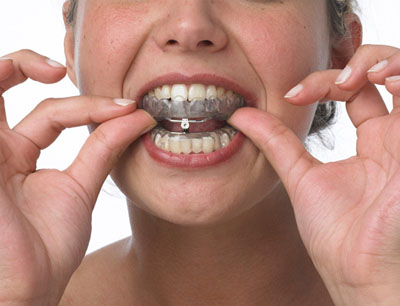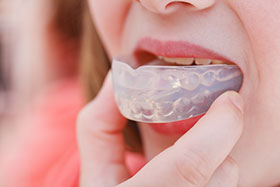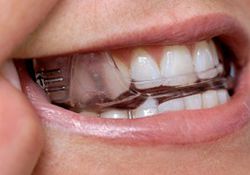Sleep apnea can be managed in several ways, one of which includes the use of oral mouthpieces. People with sleep apnea can use custom-made oral mouthpieces known as a mandibular advancement devices (MAD) or, more rarely, jaw advancing device (JAD). They are molds made of plastic that follow a person’s mouth or teeth shape. These mouthpieces are effective in stopping snoring and addressing sleep apnea. Typical examples of this kind of mouthpiece include the ZQuiet or SnoreRx.

The Way These Sleep Apnea Mouthpieces Work
The jaw is moved forward when you wear oral mouthpieces for sleep apnea. These devices prevent sleep apnea by lessening air resistance in the upper airway by increasing the airway’s size. Before considering more challenging and invasive alternatives like CPAP and surgery, try using oral sleep apnea mouthpieces first. At times a person may also be advised to lose weight if they are overweight or obese as this is also one major risk factor for sleep apnea. Mouth guards used for sleep apnea are considered anti-snoring mouthpieces since they prevent snoring by reducing airway turbulence. The turbulence is what makes the snoring “noise”.
Individuals diagnosed with mild to moderate sleep apnea can benefit the most from tailor-made oral mouthpieces that are also called as “sleep apnea mouthguards” in layman’s terms.
Prior to giving out any prescriptions, doctors will usually require patients to undergo a sleep study in order to come up with an accurate diagnosis of their condition and to help them evaluate treatment once the patient is already prescribed with an oral sleep apnea mouthpiece.
Sleep Apnea Mouthpiece Therapy Benefits
- Better therapy compliance when compared to other sleep apnea management tools
- Compact and easy to carry around – most mouthpieces can easily fit in one’s pocket
- Fast Response – users often experience relief from the first night of use
- Conserve Energy – No need to be charged or plugged into electricity
Oral Mouthpiece Therapy Results
 A common complication from oral mouthpiece therapy for the treatment of sleep apnea is Arthralgia (pain) or Temporal Mandibular Joint Arthritis (TMJ). A lesser heard of reaction is for patients to find it difficult to bring their teeth together like normal people do once they remove the device. When used for a long time, they may experience a shifting of their teeth. In order to ensure the normal positioning of one’s teeth, a patient needs to undergo orthodontic care occasionally. The Good Morning Snore Solution, meanwhile, is a different kind of mouthpiece that manages to sidestep these issues.
A common complication from oral mouthpiece therapy for the treatment of sleep apnea is Arthralgia (pain) or Temporal Mandibular Joint Arthritis (TMJ). A lesser heard of reaction is for patients to find it difficult to bring their teeth together like normal people do once they remove the device. When used for a long time, they may experience a shifting of their teeth. In order to ensure the normal positioning of one’s teeth, a patient needs to undergo orthodontic care occasionally. The Good Morning Snore Solution, meanwhile, is a different kind of mouthpiece that manages to sidestep these issues.
Make sure you set up an appointment doctor first prior to placing an online order for a sleep apnea mouthpiece. You can also go see your dentist or primary care provider for an opinion. While there are now a lot of oral mouthpieces you can customize to your mouth through the boil and bite method, not all work as advertised, so it is always better to check with your doctor first.
Oral mouthpieces are among the several CPAP options you can choose from. The mouthpiece is like using CPAP in treating sleep apnea without literally using it.
You can also try something else instead of CPAP such as dental mouthpieces specially made for the treatment of sleep apnea but these do not work for everyone. Those with moderate sleep apnea are best treated with sleep apnea dental mouthpieces.
How much does an oral mouthpiece cost?
The amount you have to pay for a mouthpiece depends on which type you choose. On the average, prepare to shell out roughly $1,800-$2,000 for a dentist-customized mouthpiece. You may think it is too expensive but the price is actually inclusive of the device itself, dental checkups and follow-ups, adjustments, and for any changes needed to be made to the dental mouthpiece. Fortunately, any expenses incurred on sleep apnea oral mouthpieces are covered by Medicare and most healthcare insurance companies. Meanwhile, boil and bite mouthpieces, which typically retail for under $100, are all over this site. Check the sidebar to read about them.
Are Dental Mouthpieces Effective Against Sleep Apnea?
The answer is yes. You can treat snoring and sleep apnea with dental mouthpieces. The use of these dental mouthpieces is becoming popular now even if CPAP is still considered the best approach in the treatment of Obstructive Sleep Apnea (OSA). It is supported by new studies proving that it is effective in the treatment of snoring and mild to moderate sleep apnea. Consult your doctor or dentist in choosing the best mouthpiece that will work for you. Getting follow-up checkups are imperative too as they can assess whether the mouthpiece is a good fit for you.
Are Dental Mouthpieces Safe?
The answer is an absolute yes for TSD mouthpieces like the Good Morning Snore Solution, and a somewhat “soft” yes for all other snoring mouthpieces, which are typically called MAD or Mandibular Advancement Devices.
The reason why MAD mouthpieces may not be safe for you is simple: the very design is typically built to freeze your jaw in place, with the idea that your jaw slipping backwards is causing the snoring. Now, this may not be an issue for many users, and certainly these devices are very popular and have worked for thousands upon thousands of snorers. But as time has passed, we at the Snoring Mouthpiece Review have heard more and more stories of jaw issues, moving teeth, and just general pain from users of these mouthpieces.
Certainly, the less rigid MAD devices like ZQuiet (with a hinge that allows for more movement) seem to have less problems than the more rigid devices like the VitalSleep, but a fact is a fact – some users are experiencing real difficulties with their mouth and jaw after extended use of these MAD mouthpieces. We are in the process of adjusting our ratings for these MADs, as we want to ensure we warn users of this serious issue. No one wants to stop their snoring in exchange for a lifetime of jaw issues.
And the worst side effect of Tongue Stabilizing Devices (TSD) like the Good Morning Snore Solution?
You might spit the mouthpiece out during sleep. That’s it. And certainly, this is one of many reasons why we have made the GMSS our 2019 mouthpiece of the year.
Issues with Sleep Apnea Dental Mouthpieces
 The most common issue raised in the use of sleep apnea oral mouthpieces pertains to compliance. The majority of CPAP devices sold these days are equipped with a tracking software that the patient and the doctor can access data that shows the number of hours of use and whether there are unusual respiratory events that took place. Since oral mouthpieces are small and handy, they can’t really do everything like a regular CPAP does. Newer models even come with built-in microchips that will enable it to track the number of hours the device was used.
The most common issue raised in the use of sleep apnea oral mouthpieces pertains to compliance. The majority of CPAP devices sold these days are equipped with a tracking software that the patient and the doctor can access data that shows the number of hours of use and whether there are unusual respiratory events that took place. Since oral mouthpieces are small and handy, they can’t really do everything like a regular CPAP does. Newer models even come with built-in microchips that will enable it to track the number of hours the device was used.
Where can you get an oral/dental mouthpiece for sleep apnea?
See your doctor first if you think you need to be treated for sleep apnea. There are different management for various conditions and your own personal medical history is a big factor also in determining the best treatment for you. Others can benefit from oral mouthpieces but some can do better with sleep therapies. Do not hesitate to share all your symptoms with your doctor because they can only help you beat sleep apnea if they know exactly what is going on with you.
Undergo a sleep study if you need to. You can start discussing OSA treatments once you are diagnosed with sleep apnea. Doctors will refer you to dentists if you need to use a dental mouthpiece. Dentists need to make a registration, which is essentially taking a mold impression of your teeth bite. It uses plaster in making a copy of your teeth. The dentist can then start making a mouthpiece with the use of your teeth model.
It has now become a popular choice for sleep apnea patients to consider the use of oral mouthpieces in treating snoring and breathing disorders for there are plenty of new and qualified dentists and manufacturers of these oral appliances. Talk to your doctor if you have problems in your breathing or sleep and they’ll help you decide if an oral device is what you need.
